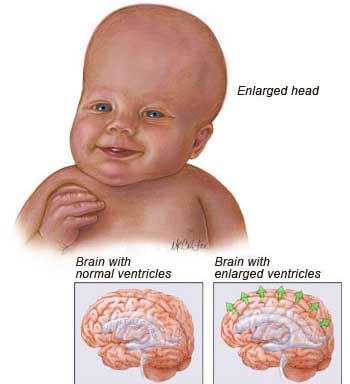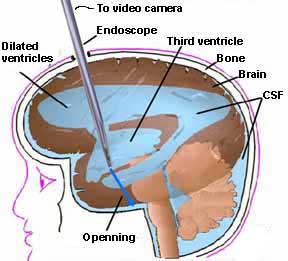HYDRACEPHALOUS IN INDIA
What is hydrocephalus ?
Hydrocephalus, is a medical condition. People with hydrocephalus have an abnormal accumulation of cerebrospinal fluid in the ventricles, or cavities, of the brain. This may cause increased intracranial pressure inside the skull and progressive enlargement of the head, convulsion, and mental disability. Hydrocephalus can also cause death.
The ventricular system is made up of four ventricles connected by narrow passages. Normally, CSF flows through the ventricles, exits into cisterns (closed spaces that serve as reservoirs) at the base of the brain, bathes the surfaces of the brain and spinal cord, and then reabsorbs into the bloodstream.

CSF has three important life-sustaining functions : -
- To keep the brain tissue buoyant, acting as a cushion or “shock absorber”;
- To act as the vehicle for delivering nutrients to the brain and removing waste; and
- To flow between the cranium and spine and compensate for changes in intracranial blood volume (the amount of blood within the brain).
The balance between production and absorption of CSF is critically important. Because CSF is made continuously, medical conditions that block its normal flow or absorption will result in an over-accumulation of CSF. The resulting pressure of the fluid against brain tissue is what causes hydrocephalus.
Hydrocephalus can be defined broadly as a disturbance of formation, flow, or absorption of cerebrospinal fluid (CSF) that leads to an increase in volume occupied by this fluid in the CNS.1 This condition also could be termed a hydrodynamic disorder of CSF. Acute hydrocephalus occurs over days, subacute hydrocephalus occurs over weeks, and chronic hydrocephalus occurs over months or years. Conditions such as cerebral atrophy and focal destructive lesions also lead to an abnormal increase of CSF in CNS. In these situations, loss of cerebral tissue leaves a vacant space that is filled passively with CSF. Such conditions are not the result of a hydrodynamic disorder and therefore are not classified as hydrocephalus. An older misnomer used to describe these conditions was hydrocephalus ex vacuo.
Normal pressure hydrocephalus (NPH) describes a condition that rarely occurs in patients younger than 60 years.2 Enlarged ventricles and normal CSF pressure at lumbar puncture (LP) in the absence of papilledema led to the term NPH. However, intermittent intracranial hypertension has been noted during monitoring of patients in whom NPH is suspected, usually at night. The classic Hakim triad of symptoms includes gait apraxia, incontinence, and dementia. Headache is not a typical symptom in NPH.
In young children, hydrocephalus may also be associated with the following conditions : –
- Infections caught before birth
- Infections that affect the central nervous system (such as meningitis or encephalitis)
- Injury before, during, or after childbirth, including subarachnoid hemorrhage
- Congenital defects
- Tumors of the central nervous system
In older children, risks for hydrocephalus include : –
- History of congenital or developmental defects
- Lesions or tumors of the brain or spinal cord
- Central nervous system infections
- Bleeding anywhere in the brain
- Injury
There are two kinds of hydrocephalus. Congenital hydrocephalus is present at birth. Causes include genetic problems and problems with how the fetus develops. An unusually large head is the main sign of congenital hydrocephalus. Acquired hydrocephalus can occur at any age. Causes can include head injuries, strokes, infections, tumors and bleeding in the brain.
Symptoms of acquired hydrocephalus can include : –
- Headache
- Vomiting and nausea
- Blurry vision
- Balance problems
- Bladder control problems
- Thinking and memory problems
List of other Hydracephalous surgery offered in India
- Shunt
- Ventriculostomy








